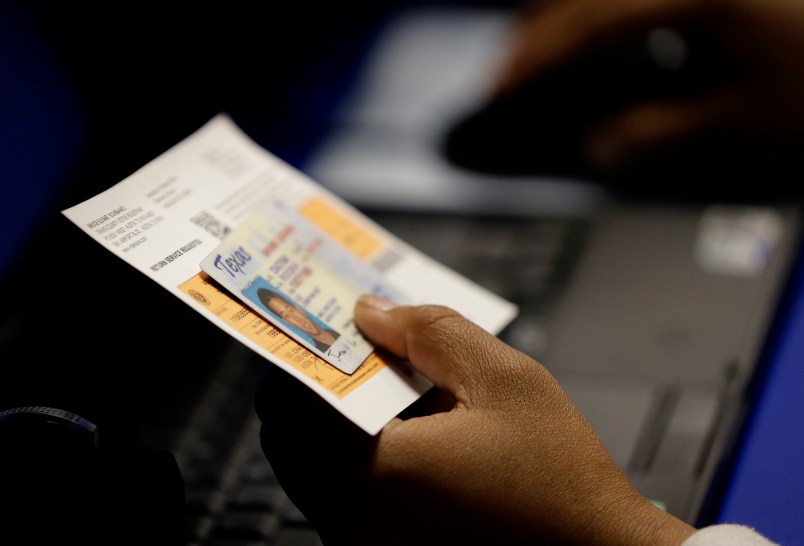Researchers at UC-San Diego are working on a study on how voter ID laws affect turnout rates, and a working paper they released detailing the results thus far seems to confirm what the laws’ critics have often said.
Voter ID laws adversely affected the turnout of minorities, and particularly that of Latinos, the paper found. The study also revealed that turnout among Democrats was disproportionately affected, backing up claims of a political motivation behind the laws, which have been overwhelmingly championed by GOP legislators.
“Our study is the first really comprehensive study that’s been done over many election cycles — I think we have something like 51 elections in there — that very clearly shows how minority voters are affected, and how they’re adversely and disproportionately affected compared to their white counterparts,” Nazita Lajevardi, one the study’s authors told TPM.
Lajevardi, a Ph.D. candidate in UC-San Diego’s department of political science, is joined on the study by lead author Zoltan L. Hajnal , a political science professor there and with Lindsay Nielson, a post-Doctoral fellow. They examined not just the turnout, but the gap among racial groups compared with white voters. Looking at states with strict photo ID laws in elections from 2006 through 2012, they found, “Where they are enacted, racial, and ethnic minorities are less apt to vote.”
Not only have the numbers of states passing voter ID laws grown considerably since the Supreme Court approved of Indiana’s photo ID law in 2008, the requirements in the laws have also gotten stricter. The paper’s authors thus focused attention on “strict” photo ID laws, meaning those “that prevent the voter from casting a regular ballot if they cannot present appropriate identification.” Seven states have strict photo ID laws in place, by the study’s count.
In general elections, states with strict photo ID laws show a Latino turnout 10.3 points lower than in states without them. The law also affected turnout in primary elections, where Latino turnout decreased by 6.3 points and Black turnout by 1.6 points.
More revealing, however, is its comparison in how the laws affect the turnout gap between minorities and white voters, who were largely unimpeded by the laws.
In primary elections, the gap between Latino and white turnout tripled in states with the restriction, from 5.0 points to 13.3 points. The gap between black and white turnout doubled in primaries — from 4.8 points to 8.5 points. The effect on Latinos also carried over to general elections, where the turnout gap doubled 5.3 points to 11.9 points.
The researchers also tested the hypothesis that the laws were having a larger effect on Democratic turnout, and thus benefiting GOP candidates.
“Not just racial consequences, there are political consequences of these laws. People always surmised that there would be a skew towards the left, but no one has actually shown it,” Lajevardi told TPM.
Indeed, the turnout gap between Republicans and Democrats doubled from 2.3 points to 5.6 points in general elections in strict photo ID states.
Aside from the time frame and number of elections the study takes into account, what set it apart from previous research is its use of more reliable data, the authors said. Rather than rely on self-reporting statistics — where minorities are known to overreport their rates of turning out — they used “validated vote” numbers offered by Cooperative Congressional Election Studies. To get those numbers, the survey project checks reports a person voted against the official voting records.
The authors also controlled for almost every factor imaginable that could also affect turnout, they said.
“We take into account literally the entire kitchen sink — everything that could possibly impact one’s ability to turn out, that’s been shown in literature, been discussed by policymakers and what not,” Lajevardi said.
Those controls included individual demographics, a state’ electoral conditions, how new a voter ID law is, and how turnout changes each year. With all these factors considered, the authors said they could zero in on the impact of the voter ID laws by themselves.
“When we look at this pattern and then we look at the gaps between these groups and whites, we can say that these laws are really limiting the ability of this new and emerging group of people to really participate in a meaningful way in American democracy,” Lajevardi said.







Great, like the GOP needed any more encouragement.
They already know it. That’s why they push for these laws.
“Surprise, surprise, surprise.”
— Gomer Pyle, 1964
UC-San Diego + lead author’s last name is “Hajnal” = MSM totally ignores this or helps discredit it.
Guaranteed: “Yeah, of course it reduced the Latino turnout…because it stopped all the illegals from voting!!!”
That’s exactly what I was thinking. I had hoped the article would give some indication of why these laws adversely affect minority voters.